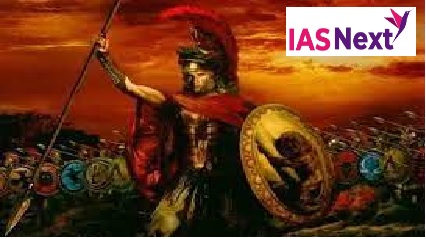CURRENT AFFAIRS
Get the most updated and recent current affair content on Padhaikaro.com
Alexander and Chandragupta Maurya
- IAS NEXT, Lucknow
- 22, Nov 2021

Uttar Pradesh Chief Minister Yogi Adityanath recently said that Chandragupta Maurya, who founded the Mauryan empire in the 4th century BC, had defeated Alexander of Macedon in battle — and yet, it is the latter whom historians have chosen to call “great”.
Legacies of Alexander vs Chandragupta:
Alexander:
Alexander was born in 356 BC at Pella in ancient Greece, and succeeded his father, king Phillip II, to the throne at the age of 20.
He came to be called ‘great’ because of his stupendous military conquests.
- He had established, before he turned 30 years of age, the largest empire the world had seen until then, which stretched across modern western and central Asia all the way from Greece to India’s northwestern frontier.
- Subsequently, Ghenghis Khan (1162-1227) stamped his authority over a bigger swathe of Asia and Europe, and other conquerors such as Tamerlane, Atilla the Hun, and Charlemagne, as well as Ashoka, Akbar, and Aurangzeb built their own very large empires.
His quest for India:
- In 327 BC, Alexander crossed the Indus, the farthest frontier of the old Persian empire, and began his Indian campaign that lasted about two years.
- The king of Taxila surrendered to Alexander.
- In the battle of Hydaspes that followed, Alexander won against King Porus.
- After the defeat of Porus, Alexander wished to march on into the heartland of the Gangetic basin — but upon reaching the Beas, the last of the five rivers of Punjab, his generals refused to go further.
- Alexander was forced to turn back, and he followed the Indus southward to its delta, where he sent part of his army to Mesopotamia by sea, while leading the other part overland along the Makran coast.
Legacy:
His aborted Indian campaign notwithstanding, Alexander is believed to have died undefeated in any battle — seemingly fulfilling the prophecies of the oracles that he would conquer the entire world.
- Alexander had travelled some 1,000 miles from Macedonia, conquering seven nations and, it is said, more than 2,000 cities.
- He hoped to solve the “problem of the ocean” that Greek philosophers had grappled with, reaching the sea, and then sailing to subjugate more new lands.
Chandragupta:
- He was the architect of an empire that controlled the plains of both the Indus and the Ganga, and which stretched until the eastern and western oceans.
- With Pataliputra at its imperial centre, the Mauryan Empire for the first time unified most of South Asia.
- Chandragupta laid the foundations of an extensive and efficient system of centralised administration and tax-collection that formed the bases of his empire.
- Trade and agriculture were reformed and regulated with the building of infrastructure and standardisation of weights and measures, and provisions were made for a large standing army.
Some Greek sources suggest that Chandragupta may have been in communication with Alexander during the latter’s Indian campaign.
Legacy:
Chandragupta overthrew the unpopular last king of the Nandas, Dhana Nanda, and occupied his capital, Pataliputra.
- Guided by the guile and strategy of Kautilya and by his own great military prowess, Chandragupta went about fulfilling his imperial ambitions.
- Once he had established his mastery over the plains of the Ganga, he moved north-west to occupy the power vacuum left by the retreat of Alexander’s army.
The territorial foundation of the Mauryan Empire had been laid, with Chandragupta controlling the Indus and Ganges Plains and the borderlands — a formidable empire by any standards.